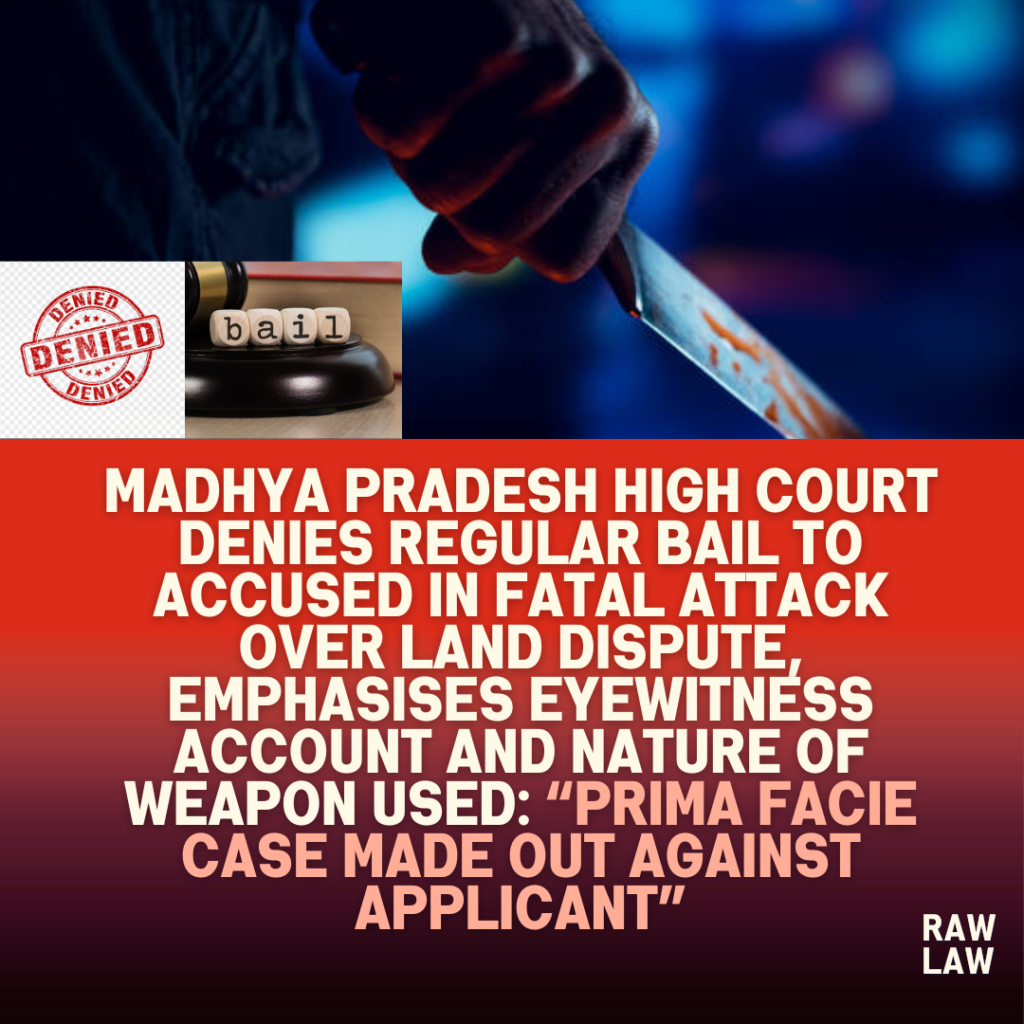Court’s Decision
The Madhya Pradesh High Court dismissed an application for regular bail filed under Section 439 of the Code of Criminal Procedure by a person accused in a murder case. The Court observed that the applicant was specifically named in the FIR and was identified by an eyewitness as the person who struck the deceased with a rod. The Court held that the allegations, supported by medical and eyewitness evidence, disclosed a prima facie case against the applicant and thus no grounds for bail existed. Consequently, the application for regular bail was rejected.
Facts
The case arose out of a land-related dispute. According to the prosecution, the complainant’s father was assaulted by the applicant using a rod, while two other co-accused assaulted him with lathis. The injured person later succumbed to his injuries. The FIR was registered under Sections 302, 294, 323, and 34 of the Indian Penal Code. The applicant, arrested in connection with the incident, applied for regular bail before the High Court after being denied bail by the Sessions Court.
Issues
- Whether the applicant was entitled to regular bail under Section 439 of the Criminal Procedure Code?
- Whether the presence of eyewitness testimony and medical evidence constituted sufficient ground to deny bail?
- Whether any mitigating circumstances existed to justify release on bail?
Petitioner’s Arguments
The applicant submitted that:
- He had been falsely implicated due to an existing land dispute between the families.
- No recovery was made from him, and he had no criminal antecedents.
- The FIR was delayed and contained discrepancies.
- The co-accused had already been granted bail, and on grounds of parity, he should also be released.
- He was in custody for a significant period and undertook to cooperate in the trial proceedings.
Respondent’s Arguments
The State opposed the bail application, contending that:
- The applicant was specifically named in the FIR and was identified by an eyewitness as the person who assaulted the deceased with a rod.
- The post-mortem confirmed injuries consistent with the weapon described.
- The applicant’s role was distinguishable from that of co-accused who had used lathis; hence, parity did not apply.
- The gravity of the offence and the nature of the assault warranted custodial detention.
Analysis of the Law
The Court examined the principles governing bail under Section 439 CrPC, particularly in cases involving serious offences like murder. While acknowledging the right to liberty, the Court noted that bail may be denied when there is prima facie evidence linking the accused to a heinous crime, especially if the accused was identified by eyewitnesses and the medical evidence corroborates the prosecution’s version.
The Court also differentiated between the role of the applicant and the co-accused, applying the principle that parity is not a universal ground and must be tested against individual involvement and evidence.
Precedent Analysis
While no specific judgments were cited, the order is consistent with:
- Kalyan Chandra Sarkar v. Rajesh Ranjan, (2004) 7 SCC 528 – Bail can be denied when prima facie case is established.
- State v. Captain Jagjit Singh, AIR 1962 SC 253 – Grant of bail depends on the facts of each case, especially seriousness of the offence.
- Ash Mohammad v. Shiv Raj Singh, (2012) 9 SCC 446 – Parity is not an absolute rule in bail matters.
Court’s Reasoning
The Court emphasised the following in denying bail:
- The applicant was specifically named in the FIR and identified as the assailant who used a rod, while others used different weapons.
- There was direct eyewitness account of the assault.
- The medical report corroborated the nature of injuries caused by a rod, thus connecting the applicant to the fatal blow.
- Given these facts, a prima facie case existed, and there were no exceptional circumstances to justify bail.
The Court concluded:
“In the considered opinion of this Court, a prima facie case is made out against the applicant… this Court is not inclined to enlarge the applicant on bail.”
Conclusion
The Madhya Pradesh High Court:
- Dismissed the regular bail application filed under Section 439 CrPC.
- Held that the presence of direct eyewitness evidence and corroborative medical evidence ruled out grant of bail.
- Directed that the trial court proceed in accordance with law without being influenced by this order.
Implications
- Reaffirms that naming in FIR and corroboration by eyewitness and medical evidence strongly weigh against grant of bail.
- Clarifies that parity does not apply when the role of the accused is distinct and more serious.
- Shows judicial caution in granting bail in offences involving premeditated or brutal acts.
FAQs
Q1. Can bail be granted if co-accused have been released?
Not necessarily. If the applicant’s role is graver or distinguishable from co-accused, bail may still be denied.
Q2. What factors weigh against bail in murder cases?
Specific naming in FIR, eyewitness account, corroborative medical evidence, and severity of the act are key grounds to deny bail.
Q3. Does absence of prior criminal record ensure bail?
No. While it is a factor, it is not determinative when the offence is grave and supported by strong prima facie evidence.
